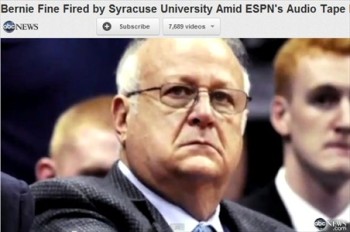
(Credit: YouTube, ABC News, screenshot)
Did ESPN and the Syracuse Post-Standard newspaper violate ethical standards by not revealing accusations against recently fired Syracuse University assistant basketball coach Bernie Fine?
The Associated Press reported on the ethical questions surrounding the two news outlets decision to take no action (either by reporting or passing the information along to police) when they obtained a tape of Bernie Fine’s wife and former ball-boy Bobby Davis, discussing Davis’ accusations against Fine. According to the AP, “The tape was not made public until a few weeks ago, after a second” person accused Fine of molestation. The AP noted that Fine lost his job “the day the tape aired.”
The local district attorney criticized the two news outlets “for not promptly sharing with police” the tape, according to the AP. The district attorney, William Fitzpatrick, said that if they had the tape earlier, they could have started investigating Fine then. The AP noted that Fitzpatrick can’t charge Fine because of the statute of limitations. Even at the time the two news outlets obtained the tape, however, “the statute of limitations had expired.
American Journalism Review’s editor Rem Rieder defended ESPN and the Post-Standard, according to the AP, noting that neither outlet had enough evidence to go forward with a story, so “it doesn’t make much sense” to give the story then to the police. Further, he noted that journalists must act independently of police.
Similarly, ESPN’s vice president and director of news Vince Doria defended not publishing the accusations because “It’s not necessarily the journalist’s role to go to the police with potential evidence that at the time we didn’t believe was strong enough to report ourselves,” the AP reported.
Poynter’s Roy Peter Clark said that despite that separation between journalists and police, his “inclination would be to share with law enforcement to the degree that I thought there might be a child or some children out there who might be vulnerable to a predator.”
The Washington Post’s Erik Wemple weighed in in a Dec. 9 blog post, in which he suggested that ESPN could have asked the police about the tape, because then the network could “ask the authority about evidence” and then “share” the tape. He added that in 2003, ESPN had “zero story” with “one on-the-record-source” and three denials or no comments.
Wemple commented that ESPN was “accountable” and transparent in its reporting this past month on the Fine accusations.
The Post-Standard on Why it Didn’t Report
The Post-Standard’s executive editor Michael J. Connor published a Nov. 20 editorial explaining “why we didn’t publish the Bernie Fine story in 2003.”
First, Connor offered some background: One of the newspaper’s reporters, who had interviewed Bobby Davis “at least three” times by phone, went to interview him in person in 2002. Davis accused Fine of having sexually “fondled” him “for about 15 years” starting when Davis was “12 or 13,” Connor wrote. Fine denies the allegations.
However, after “nearly six months” of investigation by the Post-Standard, the newspaper wasn’t able to find enough information to publish a story in 2002. The newspaper had decided not to “confront Fine with the accusations until and unless we had enough to publish” because there wasn’t any police record to back the newspaper up. Connor contrasted the newspaper’s story on Fine with the Pennsylvania Patriot-News’s reporting on former Penn State assistant football coach Jerry Sandusky: “Unlike the case in Penn State, there was no grand jury hearing evidence, no law enforcement investigation of any kind going on that we could determine, no criminal charges about to be leveled. We were on our own. Whatever we published would be outside the realm of officialdom. We had to get it right in every way.”
As such, the Post-Standard held off on publishing but intended to keep an eye on it, Connor wrote. Davis, the accuser, “then took his story to ESPN” but ESPN “reached the same conclusion” as the Post-Standard, Connor explained. “There was not enough evidence to justify publication.”
The difference in the current reporting on Fine is that enough evidence surfaced in 2011 for ESPN to proceed with the story because “a second accuser comes forward.”
ESPN on Why It Waited
In an ESPN-published Q and A, ESPN senior vice president and news director Vince Doria addressed questions about the network’s reporting.
Doria explained that the network was able to go forward because “for the first time we had a second alleged victim come forward to talk on the record.” Further, he noted ESPN had the taped conversation and a forthcoming police investigation. Concerning the tape, Doria called it “damning,” but noted that she didn’t offer any “first-hand” knowledge or evidence. Also, he noted that ESPN didn’t have any “real knowledge of how it was made” or any way of knowing for certain it was Laurie Fine.
The Poynter Institute’s Kelly McBride, who is part of the Poynter Review Project, also weighed in on ESPN’s delayed coverage of the 2003 allegations. The Poynter Review Project essentially has some Poynter staff including McBride serve as ESPN’s ombudsmen — or public editor.
McBride wrote that “Based on what Vince Doria, ESPN’s senior vice president and director of news, told us this week, it’s clear that the network didn’t have enough information to publish a story at that time. Going public would have been journalistically irresponsible.”
She noted the Laurie Fine-Bobby Davis tape wasn’t “enough for ESPN to go public” because she doesn’t give any “firsthand knowledge” of allegations. However, she wrote that ESPN “gave up prematurely” in 2003. She suggested that ESPN could have asked the police about any investigation or asked the university about any accusations. ” We do not believe ESPN acted with gross negligence, but rather a lack of persistence. And we don’t believe ESPN was responsible for leaving other children vulnerable; that’s on the Syracuse PD,” she added.
iMediaEthics has written to the Post-Standard’s Connor for comment and will update with any response.






Comments Terms and Conditions